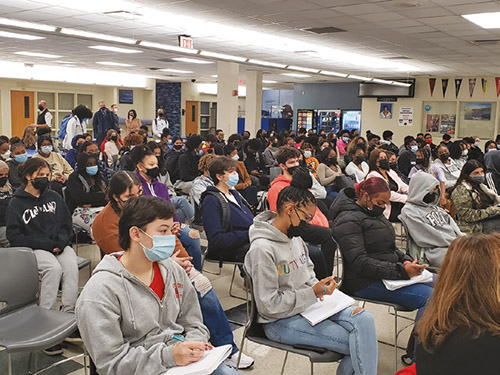

On the morning of November 16, in commemoration of Kristallnacht, over 200 Teaneck High School students gathered to hear the testimony of Michael Silberstein, a 91-year-old survivor of the Holocaust who, in a clear and articulate voice, shared his tragic experiences with the rapt audience. In her introduction of the speaker, Goldie Minkowitz, longtime mathematics instructor at THS and coordinator of Holocaust programs, reminded the audience that they may very well be the last generation to hear a firsthand account from a survivor, which is a “special opportunity and an honor.”
Michael Silberstein and his wife, Lillian, reside at Five Star Residences located on Pomander Drive off Cedar Lane in Teaneck. They moved to the area 3 ½ years ago from Poughkeepsie, New York, where they lived for over 60 years. He worked as an electrical engineer for IBM, a profession he trained for in England after liberation. While raising their two sons, the Silbersteins were very involved in the Jewish community, Lillian having worked for the religious school at Temple Beth El. Michael was frequently called upon to address the schools, synagogues and local colleges about his experiences during the Holocaust. He often addressed student audiences at Vassar, Marist and Bard Colleges.
Michael was the youngest of four children born in 1930 to a middle-class Jewish family in a small town in Poland. On the first day of the war, September 1, 1939, their town of Grujonas, located on the border with Germany, was invaded; he was 9 years old. He remembers the tortuous decision his parents had to make about where to go to protect their children. They decided to join other relatives in the city of Lodz, further inside the country. From 1939 to 1942, life in Lodz deteriorated quickly. Jews were herded into crowded quarters in the ghetto. Harsh laws were enacted against them. Schools were closed, food was scarce, medical care was lacking and medicines weren’t available. Daily life was beset by constant fear.
In 1944, the Jews were rounded up and taken to a hospital outside of town. Michael was clinging to his mother’s hand when a nurse urged her to let him loose to run down the long hallway to the end, jump out of the window and return to the ghetto. That night was the last time he saw his mother.
The family was able to survive through hard work until 1944, when the Lodz Ghetto was liquidated and its inhabitants were sent to Auschwitz. At the age of 14 Michael was alone in the most feared place on earth. After suffering through eight brutal months, he was sent on a death march to yet another horrific death camp in Austria called Mauthausen. There people lay on lice-infested wooden slats like sardines, cleaning their bodies with the remains of their bitter coffee. Finally, in January of 1945, the American forces liberated the camp. Michael was 15, alone and directionless.
Reunited with his older sister, he was sent on a Kindertransport to England. There he attended school and made up the four-year gap in his education, learning English and pursuing studies in electrical engineering. He came to the United States in 1952 and was willingly drafted into the U.S. Armed Forces, where he served during the Korean War for two years. Based in Alaska, Michael applied for U.S. citizenship and became a proud citizen serving his country. In 1955, after being discharged, he met Lillian, the “love of his life,” and they were married in 1956. They are the proud parents of two sons who are also professional engineers. Michael and Lillian have a great deal of joy from their four grandchildren and two great-grandchildren.
Michael shared the podium with his son Andrew, who held the microphone for his father throughout the program. It was obvious that father and son were both fully engaged together in imparting the lessons of this unimaginably tragic period of human history to future generations.
Assistant principal of Teaneck High School Justin O’Neill, who attended the program, was instrumental in organizing the logistics of the event and arranged for the program to be videotaped for future audiences. From the respect and attention given to the speaker throughout his presentation, it was obvious that the students received the vital message being conveyed.
By Pearl Markovitz









